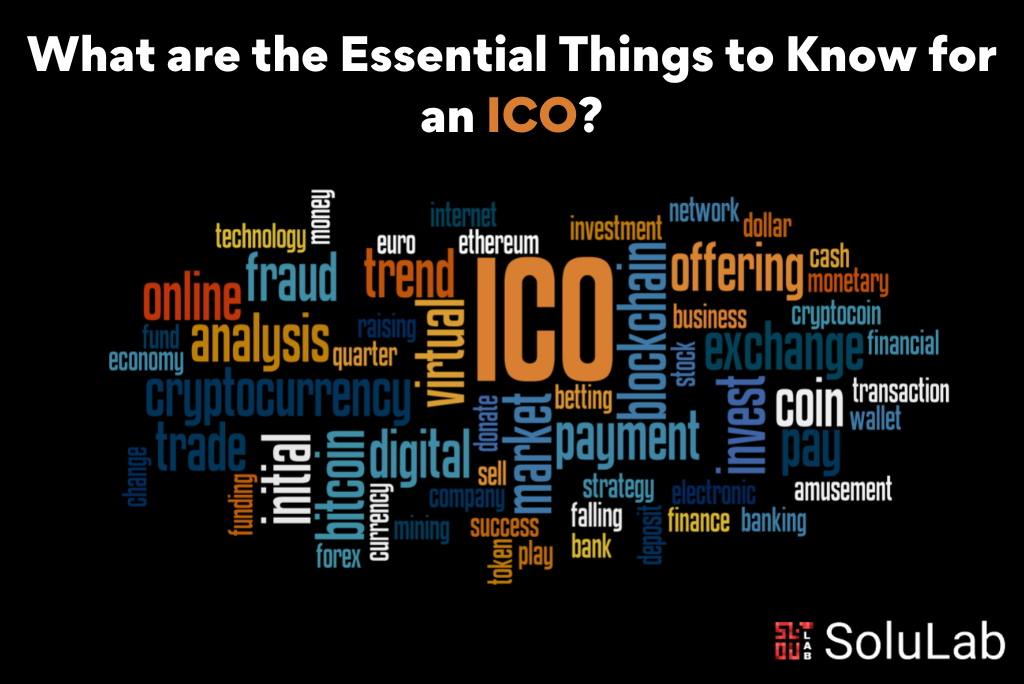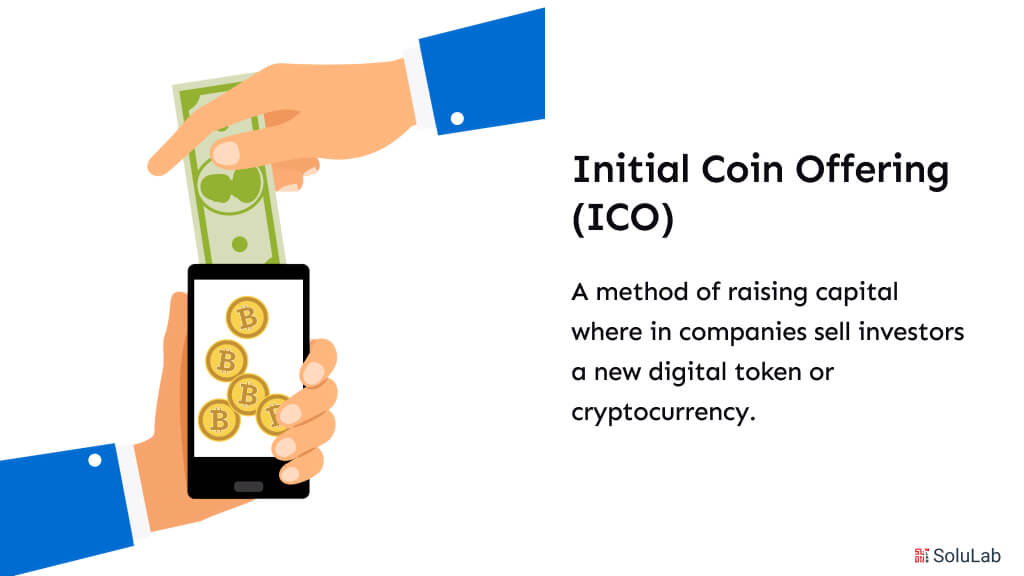
It’s crucial to understand what to seek out if you’re considering investing in these projects and meet the requirements to do so, as initial coin offerings still take place in private investment rounds and do not need any regulatory registration.
Initial coin offerings (ICOs) are quite popular among cryptocurrency investors. Their success is largely due to the daily creation of new cryptocurrencies. Remarkable sums of $258 and $275 were recently gathered by Hdac and Filecoin. Indeed, a lot of factors affect an ICO’s success. Let’s get over these Essential things to know about ICO in more detail if you’re interested in learning how to build up an ICO that will bring profits for your company. Before moving further it is important to know
What is Initial Coin Offering (ICO)?

But what does ICO stand for? The cryptocurrency’s version of an IPO is called an initial coin offering or ICO, an initial coin offering can be used by a business looking to generate capital to develop a new blockchain application or service using cryptocurrency. To obtain a new cryptocurrency created by the company, interested investors might participate in an initial coin offering. This token might have to be considered an investment in the corporation or project, or it might have some use with the goods or services the company provides.
An ICO working is a method of raising money for goods and services typically associated with cryptocurrencies Co-issued cryptocurrencies may also be used for software services or other products. Investors have made money from an ICO; others have done poorly or have been exposed as fraudsters. Registering is required for the majority of indices.
When do you need ICO?
ICO meaning cryptocurrency not only does this help to provide the idea of financial availability for various investments, but this creativity increases investment prospects and community participation. However, this knowledge of when an ICO is needed can help entrepreneurs make the right decisions. In the following four situations, launching an initial coin offering (ICO) may be crucial for your project:
Access to Global Capital
Whereas many regional constraints that often prescribe conventional approaches to fundraising put a cap on the number of qualified investors an ICO lets the entrepreneurs tap into a global market. The necessity of WeFunds results in the democratization of investment which brings potential cash accessible for creative ventures because a great number of people can participate.
Lower Costs and Less Bureaucracy
ICOs disentangle the process from numerous administrative expenses and legal requirements attached more to traditional financing methods. That makes it a financially suitable approach because, with its help, companies can allocate more of their funding towards development rather than attorney’s fees and other intermediaries.
Encouraging Community Involvement
ICOs, for instance, create a great sense of community among the token owners and are often involved in making decisions concerning the project and its development. Other than enhancing project ownership, this involvement encourages early adopters to come up with useful input that may be crucial to the project.
Early-Stage Investment Opportunities
By taking part in an initial coin offering (ICO), investors can gain the first opportunity to invest in potentially lucrative operations before they become available to ordinary people. Implicit within this potential is the ability to generate large amounts of money as and when the project grows, thus attracting a broad range of investors from both private and institutional investors seeking to spice up their portfolios.
What do we mean by an ICO rating?
Upon investing funds in an ICO, it’s of the utmost significance to study and comprehend all facets of the task to reduce risk and select feasible investment schemes. After all, numerous scam ICOs and flawed schemes are out there, so it’s essential to understand what you’re investing your funds into. One aspect of analyzing an ICO’s quality is inspecting the ICO rating.
In addition, what looks at in an ICO rating is based on an impartial and clear evaluation of a task that assesses different elements of the task and its ICO. For example, an ICO rating takes into review; (the project’s technical features of its platform, the team behind the project, the company model, its use case, the strengths and shortcomings of its decentralized network, the issue it solves, etc.) An ICO ranking can represent the project’s possible and related risks by examining these factors equitably, transparently, and trustworthy.
How does ICO Work?
The type of payments a blockchain technology project wants to accept is the first decision made by the organizers of a project that wants to get funds through an Initial Coin Offering (ICO), ICOs can be set up in several ways, such as:
Static pricing and supply: It can have a target or a cap on the financing, and what this means is that there is a set number of tokens in existence, and the number of tokens to be sold in ICO has a particular price.
- Static supply and dynamic pricing: An ICO may have a funding amount that actively increases and the number of tokens that remain constant; in this case, the total cost per token is equal to the total amount of money that was collected during an ICO.Some ICOs have a fixed price for their tokens and their supply is variable, this means that the number of funding received determines the supply. (ICO). ICOs can be set up in several ways, such as:
- Static pricing and supply: An organization can have a defined financing target or cap, meaning that the total number of tokens is fixed and that each token sold in the initial coin offering (ICO) has a fixed price.
- Static supply and dynamic pricing: An initial coin offering (ICO) may have a dynamic funding target and a static quantity of tokens; in this case, the key factor in ICO reviews is the total price per token is determined by the amount of money raised during the ICO.
- Static pricing and dynamic supply: Certain initial coin offerings (ICOs) have a static price but a dynamic token supply, which means that the quantity of the funding received determines the supply.
Release of the White Paper
Besides ICO, the cryptocurrency project creates a presentation report or the so-called pitchbook, also known in the business as the white paper, with which it approaches possible investors on the new token website. The project’s backers utilize its white paper to clarify crucial details about the first coin offering:
The purpose of the project
- The condition that should have been met by the project after its completion
- Each type of fund that is needed for the project
- How many of the founders’ virtual tokens will they keep?
- What currencies and what types of payment are accepted?
- Length of ICO promotion
The white paper is launched during ICO — the fulfillment of the project’s campaign to encourage supporters and enthusiasts to buy some of the project tokens New Tokens by the rule can be purchased with fiat and digital currency, but gradually it became a trend to pay only with other cryptocurrencies like Bitcoin and Ethereum. Some of these recently created tokens are similar to shares of stock floated in the market during an IPO.
Related: ICO Vs IPO
What to look at in an ICO
The present text outlines potential ICO risks and opportunities that should be borne in mind by an ICO development company to make the right decision. The following are important qualities to search for in an ICO:
1. Quality of White Papers
The white paper is formally known as the paper of the white, and unlike the business proposal, this one is aimed at representing the goal, the technology, and the general plan of the entire project. The specific project aim, the proposed solution, and the technical characteristics of the token should be described comprehensively in a relevant white paper. Complication or ambiguity might be the signs of possible problems if these are demonstrated by the documents as too complicated or too ambiguous; as for the aims and the vitality of the plan – it should be transparent.
2. Credentials for the Team
The third factor is that the background of the members of the project team needs to be analyzed. Check their experience both in the banking industry and blockchain technologies and associated domains. Another factor associated with the likelihood of growth in a project is the probability that the project would be handled by a team of competent people with records of having pulled similar projects. Here are some ways to know if they are genuine, check their previous records and activities in the Cryptocurrency world.
3. The use of tokens
Before understanding the function of a token, it is important to understand tokenomics, which is the economy that the token operates from. This encompasses all the tokens that exist including how they are being distributed and other frameworks that encourage retention rather than trading. Tokens must be tokens of real-world value with utility to investors and within the ecosystem, as per several models
4. Adherence to Regulations
It is necessary to pay special attention to the fact that the project adheres to all the requirements of the legislation in its jurisdiction due to the current changes in the legislation of the ICO. Check if the ICO has been registered with US agencies for securities for instance the SEC or if it has gone through necessary legalCheck. Thanks to compliance, it is possible to minimize all the risks connected with any legal actions that may be potentially dangerous to the investor’s funds.
5. Engaging with the community
A significantly large number of interested and supportive people could also be used as evidence of high interest in a specific project. Try to find active threads of people who share possible investment details on Reddit, Discord, or Telegram. The idea of getting information from the community can reveal interesting ideas in the course of the project.
How to review a cryptocurrency ICO
The funding activities in the existing and emerging virtual financial economy are known as initial coin offerings or ICO. However, with opportunities come risks by the same measure, how to review a cryptocurrency ICO is necessary because fraudulent activities are rampant and to make the right choices when investing. To properly assess an ICO, follow these crucial steps:
- Examine the White Paper: The whitepaper is the core of any kind of ICO project. Ask questions yourself if the objective of the project, nature of the technology, revenue opportunity, and the business plan are well described. Avoid generalities like just providing different solutions or values at higher, equal,l or lower levels. Also, exaggerated testimonials or vague statements should not be made.
- Assess the Advisors and Team: There is no substitute for an efficient team for the above successful project. Check with the competency profile and have a look into the background of the members of the team. Details about them can therefore be obtained from social networks, particularly LinkedIn. Similarly, ensure that you confirm of advisors’ credentials and what they have done for the project.
- Examine the Community and Transparency: It is common for healthy projects to have healthy communities or at least strong evidence of community activity. To measure interactions, create an account on a social platform like Reddit, telegram, or Discord. Positives include the ability to attend to inquiries, often updates, and willing to communicate.
- Assess Security and Partnerships: It will be useful to check the. Whitepaper for practices of partnerships with reputable organizations and the usage of smart.; Xamarin Test Cloud and Contracts & Intellectual Property. Your Money could be In danger Venturing without extra security measures.
Can Anyone Offer Tokens in ICO?
Before one is allowed to launch an ICO, it is expected that he or she has a viable blockchain-based project that needs financing and that the money will be channeled to the project using tokens. These tokens always have a utility or an asset related to the project behind the launch of the tokens. Failure to develop a proper business model or value proposition leads to project failure, or, at worst, legal issues.
The compliance part is of utmost importance or say it is highly complied in nature. Some countries have certain rules on the ICO while others classify tokens as securities. To avoid such penalties certain laws such as the SEC in the United States or similar laws in other countries must be followed strictly.
Further, the technical side requires an understanding of Smart contracts and token economies along with the importance of software Security. Traditional tokens and smart contacts; if not well designed, are prone to fraudsters or investors losing their hard-earned money.
Finally, speaking about the procedure of ICO, in fact, anyone can try to attract the audience’s attention and sell tokens, but in doing this, a person has to conduct thorough preparation, apply appropriate legal actions and services, as well as meet certain technical requirements. Non-compliance with these provisions may prompt risks both to the project and investors.
Thus, even though ICO is open to anybody today, it is a well-organized and legal process that demands significant planning and technology integration into the process. The investors in the project and the project itself might suffer if these requirements are not met.
Is ICO Legal?
The legal status of initial coin offerings (ICOs) strongly depends on the layer of regulation of the juncture nation. Across the globe, governments have had varying stands regarding initial coin offerings (ICOs); a popular method of crowdfunding using blockchain.
Several countries reside in a grey area regarding ICOs. For instance, the token distributed through the ICO offerings is deemed to be a security by the Securities and Exchange Commission –SEC in the United States and hence falls under securities laws. Failure to either register or meet these requirements might cause severe legal consequences. In the meantime, countries such as Singapore and Switzerland have passed even more ICO-friendly laws that categorize tokens as security or utility. This is true but some countries like China have gone to the extent of banning ICOs entirely.
Scams Associated With ICO
This has been made worse by the fact these security token offerings are surrounded by high risks, especially given the unstructured nature of this approach to fundraising for the expansion of a business. Most ICO scams are directed to new investors willing to make a fortune from the cryptocurrency craze.
Initial coin offerings (ICOs) that appear like legit businesses to solicit funds are fake and prevalent frauds, and other types include the “exit scams” whereby the creators of an enterprise disappear with the funds once they have been received. Satis Group data revealed that over 80% of ICOs were considered scams in 2018 alone.
The warning signs for investors are lacking clear whitepapers, no identifiable team members, overestimated profits, and forcing one to invest immediately. For all the potential that ICOs have, the fact that this sector in particular is incredibly prone to fraud shows that there must be increased oversight and more recognition of the issue.
Can SoluLab Assist You With Your ICO Experiences?
ICOs remain a valuable method to provide access to international finance, lower expenses, and a way to encourage engrossed community participation for businesses as well as investors. However, due to the potential for fraud, legal risks, and technological problems, it is not only beneficial but required to understand the concept of the Initial Coin Offering.
What sets SoluLab a blockchain development company apart is our ability to assist our clients around ICO obstacles for technical security, compliance, and transparency. One such success story is Acreage which introduced blockchain and artificial intelligence to the making of actual estate platforms redesigning the complete value proposition of the real estate asset class by making them sufficiently liquid, transparent, and efficient. Are you ready to turn your ideas into reality? For your initial and successful blockchain project, contact SoluLab today.!
FAQs
1. What does ICO stand for?
ICO is a public program that stands for Initial Coin Offering which is used to attract capital for a new cryptocurrency asset, business, or endeavor. Whenever a company’s stock becomes public it is known as Initial Coin Offering (ICO).
2. What are the requirements for an ICO?
Implementing methods that address business continuity management, incident handling, monitoring, auditing, and testing as well as conformity with international standards is essential.
3. What are ICO’s primary goals?
By protecting our information rights and empowering people to freely contribute to a flourishing society and sustainable economy, you can protect and empower individuals, especially the most vulnerable ones.
4. How ICOs Work?
An initial coin offering (ICO) can be used by a business looking to generate capital to develop a new blockchain application or service by making use of cryptocurrencies.
5. Can SoluLab help businesses with ICO working?
Yes, SoluLab can help businesses with ICO workings by offering end-to-end services such as smart contracts, currency development, whitepaper authoring, marketing tactics, etc.






